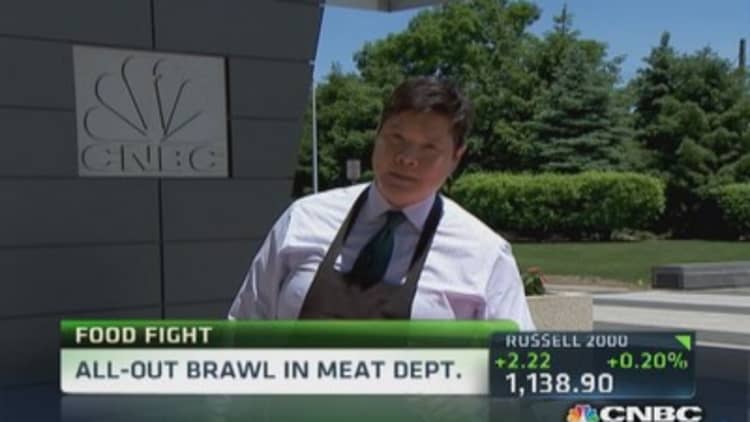More food company mergers like the by Tyson Foods for Hillshire Brands are probably on the way—but not for the reasons investors may think.
The food industry's rationale appears to go beyond a simple desire for higher stock prices, said Doug Sheahan, president of the financial advisory firm ICCF Wealth Management.
"I think it's likely that this could be a commodity play," Sheahan said.
Sheahan said that unlike other recent types of mergers, such as in pharmaceuticals, which he said were more driven by tax avoidance, food companies are fighting against the forces of nature as a vicious western U.S. drought and a disease epidemic among hogs have hammered the industry.
"With shortages of certain commodities like pork and other crops like limes and avocados, from drought and diseases, Tyson's move with Hillshire would give them the No. 1 provider of pork," he said.
The mergers are also a result of a better economy and a maturing industry, said Ronald Hill, a professor of marketing and business law at Villanova University.
Read MoreValeant, Pershing go hostile in $53.8 billion Allergan bid
"With little growth opportunities outside of changes in health trends...one way to experience growth, at least domestically, is to acquire other providers with the same or different product lines," Hill said.
And as is often the case when an industry begins a round of consolidation, a driving force among food companies is simply the fact that mergers and acquisitions by one company force others to make moves in order to stay competitive.
"An announced acquisition elicits strategic responses from competitors," said David King, a professor of management at Iowa State University.
"This has direct application to competing acquisition announcements in the food industry, with Hillshire Brands' acquisition of Pinnacle Foods disrupted first by an attempt to take over Hillshire Brands by Pilgrim's Pride and then Tyson Foods," explained King.
Bad for consumers?

The recent spate of food consolidation includes last year's proposed $8.2 billion merger between Sysco and US Foods, which is expected to close in the third quarter of this year.
Also in 2013, the Chinese group Shuanghui bought Smithfield Foods, the world's largest pork processor and hog producer. And last year, 3G Capital and Berkshire Hathaway purchased H.J.Heinz.
All that activity has turned out good for investors, said Louis Biscotti, a partner at accounting and financial advisor firm WeiserMazars.
Read MoreWill.i.am on Beats: 'We got it right'
"The food group is trading at 12 percent premium to the S&P 500, so the market is pretty hot," he said.
But Biscotti added that a boost to investors is not so good for consumers, who could see higher prices at the checkout stand.
"As larger strategic and private equity companies acquire middle-market and emerging brands, they will make improvements which require further investment and will translate to higher prices," he explained.
'Control the market'
Experts aren't sure where the next industry deal will happen but some smaller firms are likely to get gobbled up by bigger players, said WeiserMazars' Biscotti.
"While we might see more mega deals, I believe there are many more opportunities for acquisitions in the middle market as companies look for growth, and private equity looks for good investments," he said.
As for the loss of competition among food companies. Biscotti said there are always emerging and ethnic brands and private labels that should give consumers choices. He said the food and beverage industry is one of the most vibrant and stable parts of the economy, and its future prospects are good.
Read MoreStudy examines efficacy of taxes on sugary drinks
Villanova's Hill agrees, saying there's no worry about food companies becoming too big to fail, "since they do not have the ability to offer such risky goods and services without oversight."
But ICCF Wealth Management's Sheahan isn't so sure.
"It's bad anytime you have competitors going away," he said. "There will be less incentive to lower prices in stores, and that can be harmful all around. Those companies can control the market."
—By CNBC's Mark Koba



